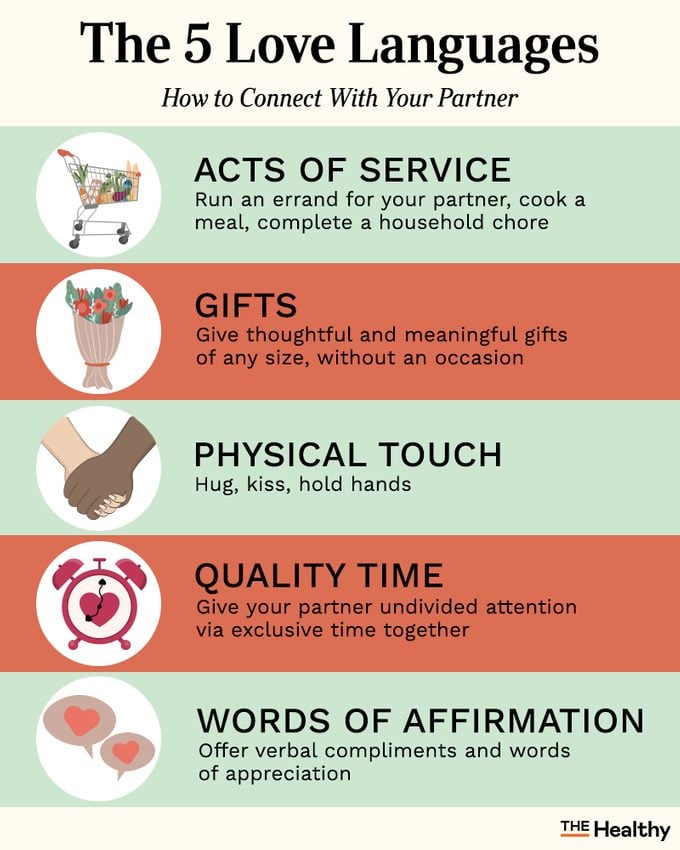How to Use the 5 Love Languages, According to Therapists
Updated: Jul. 06, 2021
Relationships are tricky, but knowing about the five love languages could make expressing love easier for you—and your partner, friends, or family members.
Our editors and experts handpick every product we feature. We may earn a commission from your purchases.
On This Page
Love languages
Your love language isn’t English, Italian, German, Portuguese, or any other verbal language you can learn in school. The term refers to the ways in which people give and receive love in their lives.
Although this includes romantic love, it may also affect how we prefer to give and receive love in friendships and other relationships too.
They can also shed light on your personal habits or behavior that might not seem to be linked to love languages or relationships at all.
For example, a viral TikTok pointed out that your love language could be linked to self-destructive habits. If your preferred love language is words of affirmation, you might be prone to negative self-talk, or if your love language is gifts, you may tend to over-spend.
That’s just one of the many ways people might use love languages to learn more about relationships and their own mental health.
Not sure what your love language is? Here’s what you need to know about the five love languages, including love language examples, how to determine yours, and other insights and relationship advice from therapists.
The history of the five love languages
The love language concept comes from the book The 5 Love Languages by Gary Chapman, which was first published in 1992.
In it, he describes the most common ways that people communicate love, based on his experience in marriage counseling and linguistics.
Everyone has a different idea of how to express love to those around them, explains Sanam Hafeez, a neuropsychologist and faculty member at Columbia University in New York City.
The trick is avoiding language barriers when your love language differs from that of your partner, family, or friend.
Couples need to find balance and harmony given their respective styles and differences to make sure they speak the language of love, says Jane Greer, a marriage and family therapist in New York City and author of several books, including What About Me? Stop Selfishness From Ruining Your Relationship.

What are the five love languages?
Acts of service
“Some of us prefer to express our appreciation through various acts of service, like running errands for our partners,” Hafeez says.
This love language essentially refers to the things loved ones do for each other to make their lives easier.
Gifts
Giving or receiving gifts is a somewhat straightforward love language. People value the thought and effort that goes into the gift-giving process.
“People who speak this language cherish the gift and the time and thought put into the gift,” Hafeez adds.
Physical touch
Physical signs of affection, like hugging, kissing, holding hands, cuddling, and having sex, are ways to connect and communicate appreciation for those who prefer this love language.
“The love language physical touch includes those who require physical attention to express and know that they are loved,” Hafeez says.
Quality time
Those who identify with this love language prioritize spending attentive time with their partner or loved one.
People who rely on quality time to express their passion need undivided attention from their loved ones instead of a simple “I love you,” according to Hafeez.
Speaking this love language may look like identifying a favorite activity to do together, acknowledging it, and doing it together.
Words of affirmation
People who prefer this love language value verbal and/or written communication and acknowledgment.
Those who speak this language prefer to express and receive their love through spoken words, rather than just spending time together, per Hafeez.
(Do positive affirmations work?)
What is my love language?
Determining your love language requires looking at how you prefer to express and receive love. Hafeez notes that you can identify with more than one.
“Not everyone has just one way that they like to show their appreciation,” she says. “It’s common to have a combination of the five.”
Paul Hokemeyer, a clinical and consulting psychotherapist in New York and author of Fragile Power: Why Having Everything Is Never Enough adds that not only is it possible to have more than one love language, but it’s also beneficial.
“Humans are dynamic and multidimensional. We change and grow over time,” he says. “As such, we need to be able to communicate in a host of languages. The ability to do so opens up our lives and our hearts and enables us to have rich and meaningful lives.”
And, no, one language isn’t “better” than another.
“I think to make a judgment over which is better or not is to ultimately limit the way love is conveyed, shared, and expressed,” Greer says.
Consider this information to learn more about your love language, or opt for one of the quizzes below to find out more.
Love language tests
The pros of love languages
Hafeez says that knowing each other’s love languages can be very helpful for both parties while in a relationship. Hokemeyer agrees, saying the concept of love languages is brilliant. Here’s how they may help:
Deepen understanding
Rather than question whether you’re meeting your partner’s needs, discuss love languages to get a deep understanding of what they need, recommends Hafeez.
“Knowing how to communicate and express your love eliminates miscommunication in the relationship,” she says.
Greer adds that another benefit is that love languages help your partner appreciate what’s important to you, what you consider loving, and what you appreciate.
Improve communication
People can form better relationships with more communication if they know how to express and receive love, according to Hafeez.
For example, if someone knows they need words of affirmation to feel loved, they can communicate that to their partner, making the relationship much healthier.
Simplify love
Love languages give people a concrete way to think about how to give and receive love in a meaningful way, according to Hokemeyer.
“They provide us with language to talk about what can be a very abstract feeling,” he says. This helps people manage the raft of consuming negative feelings when we intuitively know the relationship isn’t right.
Build the relationship
Romantic relationships require reciprocation to be meaningful and enduring, Hokemeyer says. That means that there must be an emotional and physical give and take.
“Love languages enable people to figure out what they want to take and what they need to give,” he says. “They are helpful in that they provide a starting point from which couples can learn about their partner and themselves.”
For this reason, it’s important to look at them as an art form that you are constantly practicing and striving to improve, Hokemeyer says.
The cons of love languages
A 2017 study in the journal Personal Relationships looked at whether couples with aligned love languages experience more relationship satisfaction.
The researchers looked at 67 couples and found that neither sharing the same love language nor knowledge of a partner’s primary love language corresponds with higher relationship satisfaction.
So although the experts see value in this concept, there are limits to the benefits.
It can be narrow-minded
Hafeez says that, in some cases, love languages can hurt a relationship. “If all the focus is put on speaking in your partner’s love language, you can sometimes forget to listen to what they are saying,” she says.
In addition, love languages can change throughout a relationship, so just sticking to one love language can eventually become irritating, according to Hafeez.
That’s a real downside, according to Hokemeyer, who says identifying your love language may cause you to see it as fixed and exclusive.
“The truth of the matter is that most people are bilingual—they can enjoy multiple love languages,” he says.
It’s key to remember these languages are dynamic. They can change throughout life as people mature and come to value different aspects of love and romance.
It could cause competition
Another problem: love languages can create an issue of “who does more” overall for the relationship.
For example, one person can feel as if they are speaking their partner’s love language all the time, but maybe their partner isn’t stepping up to the plate, Hafeez explains.
“This can create a sort of score-keeping attitude and create ongoing issues, such as feeling like one person loves more in a relationship or that the relationship is unequal,” she says.
The discussion may be misread
Another con that could come out of discussing love languages is that sometimes, when you tell your partner what you like, want, or need, they can translate it as a demand. They may misinterpret it as a control tactic, Greer explains.
It’s not a cure-all
It’s important to remember that knowing each other’s love language will not cure all your relationship troubles, Hafeez notes.
Need some relationship SOS? These are expert tips on how to fix a broken relationship.
How to talk to a partner about love languages
If you keep those limitations in mind, it may still be worth talking about love languages with your partner. Here’s what the experts recommend.
Start with what you love
Before discussing your love language with your partner, try to think about certain things that they do that make you feel loved and seen, Hafeez suggests.
For example, instead of just saying, “my love language is acts of service,” you can say, “When you go to the grocery store for me, I feel your love.”
Suppose you feel that your partner is not entirely speaking your love language.
In that case, you can say, “It makes me upset when you don’t do errands for me” or something along the lines of, “When I’m upset, instead of buying me flowers, do you mind running errands for me?”
Hafeez says that way, your partner can explicitly know how to make you happy, without any misunderstandings or fighting.
Greer also likes this tactic, encouraging each person to speak in terms of what they would like and keeping a focus on the positive.
Mentioning what your partner is already doing well ensures he or she doesn’t feel deficient or unappreciated.
Be direct
“I’m all about being direct and truthful in relationships,” Hokemeyer says. “If the concepts of love language are important to you, tell your partner directly and unequivocally.”
He suggests a simple statement such as, “Not sure if you’re familiar with love languages, but I’m fascinated with them. I’m thinking that I’m an X and you’re a Y. What do you think?”
Then silently let your partner state their position.
Greer also suggests sandwiching this conversation with what you love. First, acknowledge what they are doing, how good that makes you feel, and then express what you would like.
So you may say something like, “I so appreciate that you help me out with the laundry. You know what also I would love is if occasionally you came up and just gave me a kiss.”
(Here are some date night questions you can ask each other.)
Prepare for adjustments
Even though you’re the one bringing up this concept to your partner, prepare to make changes to use their love language too.
Greer says that, even if it’s outside your comfort zone, you may want to try and extend yourself to be demonstrative in the language of love that speaks to your partner, not necessarily your own.
Next, check out how to build trust in a relationship.





















